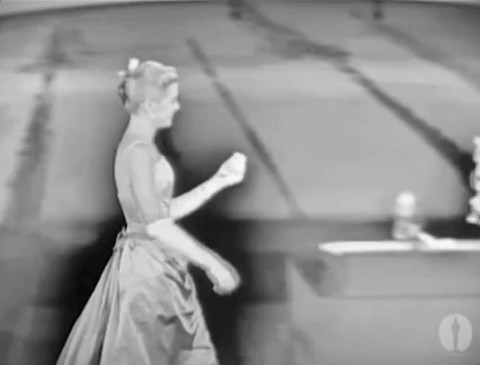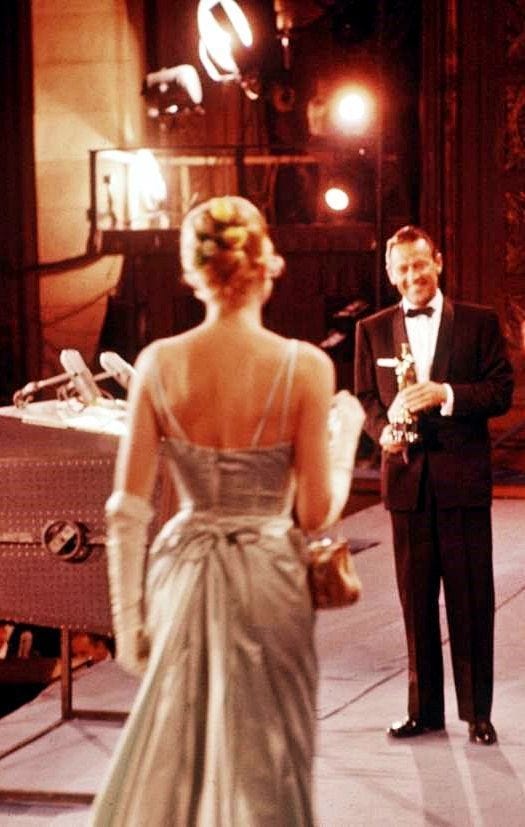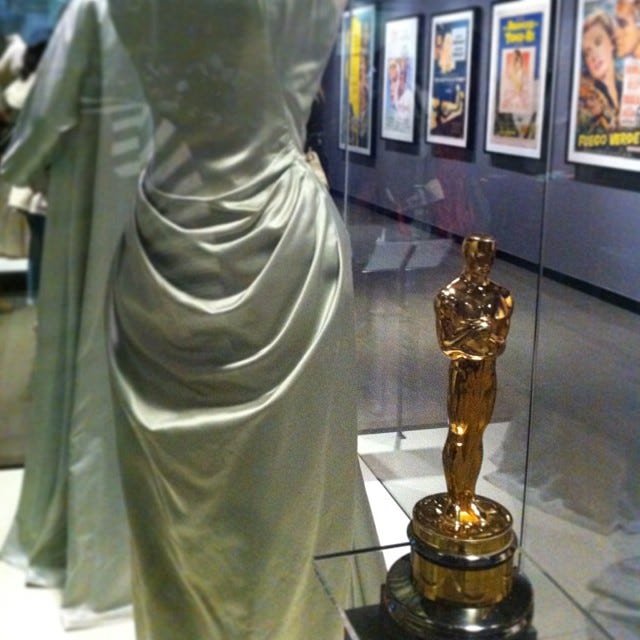And the Oscar Goes to [Princess] Grace Kelly!
Today I want to look back at one of my favourite Oscar moments: when Grace Kelly won an Oscar in 1954 for The Country Girl.

Before she was Her Serene Highness Princess Grace of Monaco she was Grace Kelly: one of the coolest, most glamorous actresses in Hollywood. In 1954 alone, she starred in five films, including the now-classics Rear Window and Dial M for Murder, and the film which garnered her an Oscar: The Country Girl.
Her other classic credits include High Noon, To Catch a Thief, and High Society, but it’s her Hitchcock collaborations and those dreamy Edith Head/Helen Rose costumes that mainly keep her relevant to modern audiences.
To do so, in my opinion, is a disservice to her legacy. Grace had serious talent and studied at the American Academy of Dramatic Arts before she struck it big. Not only that, when she insisted on going to New York and becoming an actress (an idea her parents hated but only accommodated because they thought she wouldn’t last on her own), she took modelling jobs to foot the bill and became totally self-reliant as she started appearing in live television productions and commercials, in addition to booking lucrative print modelling jobs.
By the time The Country Girl came around, Grace had made several films, had an Oscar nomination under her belt (for Mogambo, which is the reason she’d signed a contract with MGM in the first place—for the chance to film a movie with Clark Gable on location in Africa) and a contract that gave her virtually everything she’d asked for—namely, time off every other year to go back to New York to appear in Broadway productions. And if she didn’t explicitly get what she wanted, she fought until she got her way.
Grace was known for refusing projects that MGM tried to force her into, and often fought to be loaned out to other studios. Some of her biggest films weren’t even MGM films at all! Rear Window, To Catch a Thief, High Noon, and The Country Girl were all made at other studios.
It’s hard to hold you to a contract when you’re always threatening to retire if you don’t get your way. And when you have the money that Grace did, not only from her modelling days, but from her Kelly trust fund, you have something in addition to that temerity to back you up.
Enter: The Country Girl.
Grace desperately wanted the role of Georgie Elgin, the long-suffering wife to an alcoholic and washed-up actor. The only problem? It was a Paramount film, and MGM wasn’t about to loan her out when they had a perfectly nice project ready for her.
Remember Green Fire? Of course you don’t!
MGM was adamant that she make Green Fire. Grace was adamant that she was going to make The Country Girl. MGM refused. Grace threatened to retire and go back to New York City, and to tell the press why she was doing so. MGM blinked, shocked at the audacity that she’d blackmail them, and rescheduled production to give Grace time to film The Country Girl. It wasn’t a total win, though. She still had to come back and make Green Fire when it was all said and done.
If you’ve gotten this far and you’re thinking, “Jess, surely you’re painting Green Fire in a more negative light than it deserves,” don’t take my word for it. Here’s a quote from Grace’s co-star, Stewart Granger, about the film: “I had the misfortune to be in the only really bad movie Grace ever made.”
Or listen to Grace herself, who said:
[Green Fire] was not the kind of picture I became an actress to do. I had to accept it for the chance to do The Country Girl and it taught me a lesson—never agree to a role before reading a script.
Of course, fighting against Green Fire wasn’t the last time Grace fought MGM about the movies she wanted to make. She kept refusing their offers throughout the year and MGM finally called her bluff: she was placed on suspension until she agreed to be a team player.
Fine by Grace. She called the press. And the press called MGM and all they could do was sheepishly confirm the news. This was weeks before the Oscars, where Grace had been nominated for Best Actress. Grace was unfazed with her suspension, of course, and carried on as usual. MGM relented and lifted the suspension only a week before the ceremony, not wanting the embarrassment of one of their stars potentially winning the biggest prize in acting while in the dog house.
Grace wasn’t the odds-on favourite heading into Oscar night; that honour belonged to Judy Garland, who was making a comeback (after a long series of personal and professional stumbles and setbacks) in A Star is Born. But Grace was declared the winner in what’s rumoured to be one of the closest races of all time. Supposedly, she won by only six votes.
Judy Garland was devastated, and Groucho Marx sent her a telegram calling her loss “The biggest robbery since Brinks.”
It’s interesting to note that if Oscar rules from the ‘30s had been in effect that night, they would’ve each received an Oscar. In 1932 Fredric March had one more vote than Wallace Beery for Best Actor, and because they were within three votes of each other, they were both rewarded.
Unfortunately for Grace, she later confessed that she hadn’t enjoyed the win. She said:
I was unhappy. I had the fame, but you find that fame is awfully empty if you don’t have someone to share it with.
She said that the happiest moment of her life—which a reporter thought her Oscar win might have been—was when Princess Caroline first started walking and threw herself into Grace’s arms.
And if you think maybe Grace was being a tad melodramatic, consider that her father, whose approval she was constantly trying to win, was shocked that she won and sat at home in disbelief that her name had just been called. He always compared her unfavourably to her older sister Peggy, even when she became the Princess of Monaco. He’d tell anyone who would listen that, of the two, “I thought it would be Peggy. Anything that Grace could do, Peggy could always do it better."
 It’s little wonder that with all that unhappiness in her life and professional career that Grace was ready to give it all up. You know the rest of the story. Grace was chosen to attend the 1955 Cannes Film Festival later that spring, and was driven up the coast to Monaco to meet a little-known Prince Rainier III at his palace for a feature in Paris Match magazine.
The rest is history. Grace and Rainier announced their engagement in early 1956. One of Grace’s final acts in Hollywood was to attend the Oscars that year, presenting the Oscar for Best Actor to Ernest Borgnine.
Grace and Rainier married on April 18 (civilly) and April 19 (religiously). They had three children before her untimely death in a car accident in 1982. Grace never returned to her Hollywood career, though she seriously considered it in the 1960s. A planned Hitchcock collaboration was cancelled when the the reaction of Monegasque citizens proved too harsh.
Grace reportedly kept her Oscar in a sitting room in her apartment at the Prince’s Palace of Monaco; and Prince Albert, her son, now owns it. He lends it out to exhibitions from time to time, which is how I saw it in Montreal in 2013.
It’s little wonder that with all that unhappiness in her life and professional career that Grace was ready to give it all up. You know the rest of the story. Grace was chosen to attend the 1955 Cannes Film Festival later that spring, and was driven up the coast to Monaco to meet a little-known Prince Rainier III at his palace for a feature in Paris Match magazine.
The rest is history. Grace and Rainier announced their engagement in early 1956. One of Grace’s final acts in Hollywood was to attend the Oscars that year, presenting the Oscar for Best Actor to Ernest Borgnine.
Grace and Rainier married on April 18 (civilly) and April 19 (religiously). They had three children before her untimely death in a car accident in 1982. Grace never returned to her Hollywood career, though she seriously considered it in the 1960s. A planned Hitchcock collaboration was cancelled when the the reaction of Monegasque citizens proved too harsh.
Grace reportedly kept her Oscar in a sitting room in her apartment at the Prince’s Palace of Monaco; and Prince Albert, her son, now owns it. He lends it out to exhibitions from time to time, which is how I saw it in Montreal in 2013.
 And that’s the story of Grace Kelly and the Oscars!
___
For what it’s worth, here are my Oscar predictions:
Best Picture: Parasite (or 1917, though I’m rooting for Parasite)
And that’s the story of Grace Kelly and the Oscars!
___
For what it’s worth, here are my Oscar predictions:
Best Picture: Parasite (or 1917, though I’m rooting for Parasite)
Best Actor: Joaquin Phoenix, Joker
Best Actress: Renee Zellweger, Judy
Best Supporting Actor: Brad Pitt, Once Upon a Time…in Hollywood
Best Supporting Actress: Laura Dern, Marriage Story
__
This originally appeared in my royal newsletter, Yellow Dress Press, published February 8, 2020.
I was unhappy. I had the fame, but you find that fame is awfully empty if you don’t have someone to share it with.


For what it’s worth, here are my Oscar predictions:
Best Picture: Parasite (or 1917, though I’m rooting for Parasite)
Best Actor: Joaquin Phoenix, Joker
Best Actress: Renee Zellweger, Judy
Best Supporting Actor: Brad Pitt, Once Upon a Time…in Hollywood
Best Supporting Actress: Laura Dern, Marriage Story
__
This originally appeared in my royal newsletter, Yellow Dress Press, published February 8, 2020.
Best Actor: Joaquin Phoenix, Joker
Best Actress: Renee Zellweger, Judy
Best Supporting Actor: Brad Pitt, Once Upon a Time…in Hollywood
Best Supporting Actress: Laura Dern, Marriage Story
__
This originally appeared in my royal newsletter, Yellow Dress Press, published February 8, 2020.
Comments
Post a Comment